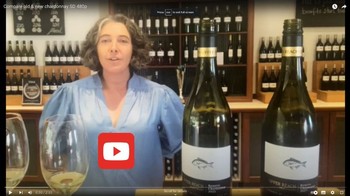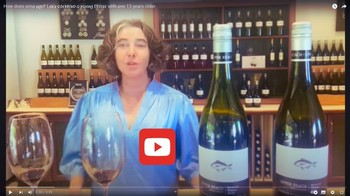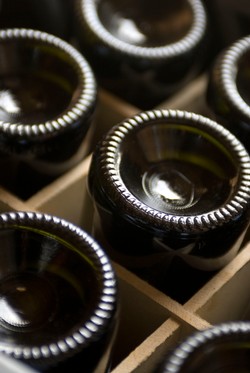What Wines Should I Be Ageing?
In the Cellar Door, we are often asked:
How can I age wine?
What wines should I age?
Let's answer some of your questions about aging wines.
Wine is constantly changing and evolving in the bottle; if you are catch a wine at the perfect place on its journey, you'll experience flavours you never imagined.
Invest Wisely, Explore Freely
However, not all wines improve with age, if a wine isn't good when young, it won't miraculously transform into a great wine with age....surprise!
Investing in a bottle that has a proven cellaring life is the best way to start.
Ideally buy 6 or 12 bottles of the wine you want to age, then opening one or two every year, to work out when you love the wine.
It really doesn't matter what anyone else thinks or the critics reccommend- it's all about your palate and what you like.
Help Along the Way:
If you’ve stashed some wine away and years later you discover a treasure, don’t be afraid to call the winery for guidance, they’ll be delighted to hear from you.
We often get calls asking about one of our wines that have been discovered in the wine rack at home.
We can give you advice on whether it is great now or if you could keep it for a few more years.
Become an Expert in an Hour:
The quickest and easiest way to become a Wine Aging Expert:
- get great knowledge on starting your own cellar
- learn more about aged wines,
- join one of our Wine Education Classes. The Wine 103- how wine ages.
We taste older wines and compare them to their younger counterparts to see how wines age. You'll also discover what wines have good cellaring potential as well as experiencing the difference that a little verses a lot of aging makes.
What Wines Age Well?
Cellaring wines will change (and generally) improve a well-chosen wine.
This is a unique advantage of buying your wines direct from the winery, as we will give you the very best advice about the ageing potential of your specific wine.
White Wines
The majority of white wines are made to be drunk young, however there are exceptions.
I’d suggest ageing Oaked Chardonnays and white wines with higher acidity, such as a dry Verdelho, Riesling or Semillon.
As white wines age the colour transformation over time is astonishing, they transform from a light, almost water-like colour to deep gold.
The oak and fruit flavours meld into one as the wine softens and develops.
If you have never thought about aging a dry Verdelho- think again.
This crisp white wine develops into the most wonderfully rich, unctuous wine with some bottle age. Verdelhos show beautiful honey, dried herb and spice characteristics.
Red Wines
When Cellaring a red wine, it ought to have a robust structure, bold tannins, good acid and oak, plus great fruit!
 Generally, less expensive or mass-manufactured wines don’t cellar for as long, the fruit tends to be less intensely flavoured, and the wine will have had less time in oak and in fact, may not have been aged in an oak barrel at all.
Generally, less expensive or mass-manufactured wines don’t cellar for as long, the fruit tends to be less intensely flavoured, and the wine will have had less time in oak and in fact, may not have been aged in an oak barrel at all.
Then the oaky flavour may come from a different method (oak chips, staves, there are all sorts of options).
The resulting wine's structure will be much less complex, and it is this structure is needed to support and carry the flavour development through the years to create a wine that ages well.
Cabernet Sauvignon and Shiraz are the best ageing option for beginners.
We have picked two here that will age beautifully.
These will suit a longer cellaring of up to 10 -12 years.
Over time the colour of red wines gets less intense and becomes more 'brick red' rather than 'violet red'.
The tannins tend to clump together and fall to the bottom of the bottle as sediment.
This both smooths out the wine and will alter its colour.
Wine Storage Tips for Success 
Believe it or not, you do not need a purpose-built wing of the house or basement to age your wines.
In the past I have kept my age-worthy wines inside an esky in the cupboard.
- Temperature Stability:
Maintain a consistent temperature range of 13-18°C to prevent premature aging or deterioration of wine quality.
- Darkness:
Store wines away from direct sunlight to minimize the risk of light exposure, which can lead to flavor degradation.
- Minimal Movement:
Minimize vibrations and disturbance to bottles, as excessive movement disrupts the aging process and maybe increased sediment
If you're getting fancy....and have wines sealed with cork:
- Horizontal Storage: Store cork-sealed bottles horizontally to keep the cork moist and maintain a tight seal, preventing air infiltration.
-
Humidity Control: Aim for a humidity level of around 50-70% to keep corks moist and prevent oxidation....this was more important for wine with corks, to stop the cork from drying out.
It isn't a big issue for wine sealed with a screw cap.
When Can I Open These Ages Wines?
As a general rule of thumb, if you find a wine that you like (budget permitting) buy a dozen, put 6 bottles within easy reach, and then squirrel away the other six to be enjoyed over 6 or 12 years.
The best wine producers will give you an ageing estimate on the back label, this would be under good cellaring conditions, so use it as an estimate.
Buying wine directly from the winery means you can ask the experts for the wine's cellarding potential. I sugest writing it on the bottle or use one of the many handy apps to keep track of your personal cellar.
When buying wine, you probably have a plan as to how long you’d like to keep it for, I still just put a sticker on the top of the bottle cap, saying the year that you plan to drink the wine.
Old school, I know!
The Benefits Of Buying Older Wine From A Winery:
The main benefit of buying aged wine at a winery is that you can be confident that it has been stored perfectly. The way it is kept will be done as driected by the winemaker.
Derek, our winemaker, has a vision for what his wines will be like in 5, 10 and 15 years. The best way the wines can achieve this is by being meticulously observed and tasted over time for quality assurance.
Our Museum Wines are only available to our VIP Cellar Club Members, so join up!
Click the link below if you want to access the Museum Range:
Conclusion:
Aging wine is not merely a process—it's a journey of discovery and (hopefully) delight.
With a discerning palate and a willingness to embrace the unknown, you'll unlock a world of flavors and aromas that you never expected. So, venture forth, select your bottles wisely, and let the magic of aging wine unfold.
"The most important thing to remember is, ageing wine is a hobby, so don’t get too caught up in the technicalities, just enjoy the journey!" ~ Laura Pearse